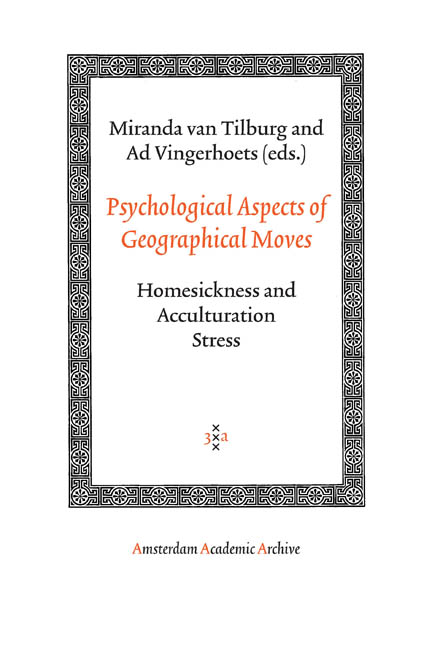Book contents
- Frontmatter
- Preface
- Contents
- Contributors
- 1 The Homesickness Concept: Questions and Doubts
- 2 Culture Shock, Homesickness, and Adaptation to a Foreign Culture
- 3 The Psychological Context of Homesickness
- 4 Geographical Moves and Psychological Adjustment
- 5 Homesickness and Acculturation Stress in the International Student
- 6 Psychological and Psychosocial Adjustment of Migrants: Families in a Changing Environment
- 7 Individual Differences in Acculturative Stress Reactions: Determinants of Homesickness and Psychosocial Maladjustment
- 8 The Cry for the Lost Placenta: Cultural Bereavement and Cultural Survival among Cambodians who Resettled, were Repatriated, or Stayed at Home
- 9 Children's Coping with Homesickness: Phenomenology and Intervention
- 10 Homesickness after Relocation during Early Adolescence
- 11 Personality, Temperament, and Homesickness
- 12 Homesickness, Personality and Personality Disorders: An Overview and Therapeutic Considerations
- 13 Health Issues in International Tourism: The Role of Health Behavior, Stress and Adaptation
- 14 Development of Psychopathology in International Tourists
- Miscellaneous Endmatter
1 - The Homesickness Concept: Questions and Doubts
Published online by Cambridge University Press: 23 January 2021
- Frontmatter
- Preface
- Contents
- Contributors
- 1 The Homesickness Concept: Questions and Doubts
- 2 Culture Shock, Homesickness, and Adaptation to a Foreign Culture
- 3 The Psychological Context of Homesickness
- 4 Geographical Moves and Psychological Adjustment
- 5 Homesickness and Acculturation Stress in the International Student
- 6 Psychological and Psychosocial Adjustment of Migrants: Families in a Changing Environment
- 7 Individual Differences in Acculturative Stress Reactions: Determinants of Homesickness and Psychosocial Maladjustment
- 8 The Cry for the Lost Placenta: Cultural Bereavement and Cultural Survival among Cambodians who Resettled, were Repatriated, or Stayed at Home
- 9 Children's Coping with Homesickness: Phenomenology and Intervention
- 10 Homesickness after Relocation during Early Adolescence
- 11 Personality, Temperament, and Homesickness
- 12 Homesickness, Personality and Personality Disorders: An Overview and Therapeutic Considerations
- 13 Health Issues in International Tourism: The Role of Health Behavior, Stress and Adaptation
- 14 Development of Psychopathology in International Tourists
- Miscellaneous Endmatter
Summary
Introduction
In today's world more and more appeals are being made to our adaptational capacities. The time of living and dying in the place where we were born in is long past. Current educational, professional, and – not in the least – recreational activities take us away far from our home environment and bring us into contact with other places and other cultures for shorter or longer periods. International exchange programs, dispatchment movements, migration, and international tourism make us spend less time in our familiar environment than we ever did before. In addition, we must not forget special and vulnerable groups, such as refugees all over the world, those who are forced to leave their home countries for whatever reason and people undergoing hospitalization and institutionalization. In short, modern man has to be prepared to break the bonds with the home environment and to adapt to new and, in many respects, demanding surroundings. Being separated from the familiar environment may induce a reaction complex with characteristic accompanying emotional, somatic, and behavioral elements and cognitions that may be labeled as ‘homesickness.’
When reviewing the scientific literature on homesickness, it is amazing to see that – especially in American literature – hardly any attention has been paid to this phenomenon. Is the American culture not familiar with homesickness (in adults), because there one does not have real roots, as an American colleague once suggested? Or, alternatively, is homesickness taboo and not socially accepted in the U.S.A.? How can it be possible that Altman and Low (1992) published a volume (see also Giuliani & Feldman, 1993) entitled Place Attachment, in which the term homesickness was only mentioned on one single page? On the other hand, a search on the world wide web with homesickness as search term yields many hits in particular focusing on school camps and the transition of students to university. In addition, there are, also in American literature, sufficient indications that residential moves and migration may be associated with increased distress and risk of mental and physical disease.
For example, making a residential move is included in the Holmes Rahe (1967) Social Readjustment Rating Scale and other life events scales. Admittedly, though not top of the list: position 32 with 20 life change units, it is nevertheless listed.
- Type
- Chapter
- Information
- Psychological Aspects of Geographical MovesHomesickness and Acculturation Stress, pp. 1 - 16Publisher: Amsterdam University PressPrint publication year: 2006
- 3
- Cited by

